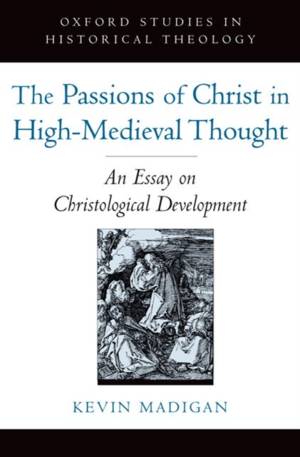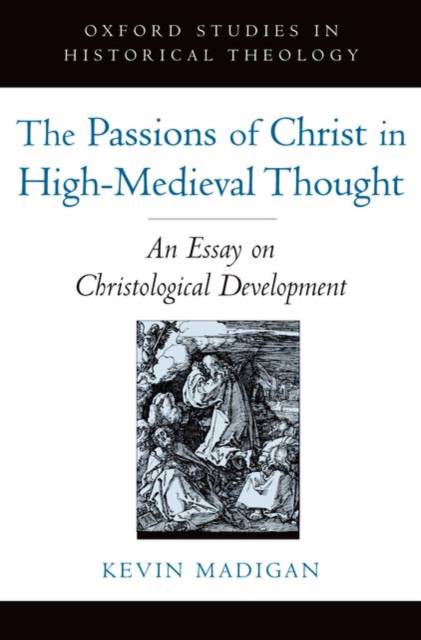
- Retrait gratuit dans votre magasin Club
- 7.000.000 titres dans notre catalogue
- Payer en toute sécurité
- Toujours un magasin près de chez vous
- Retrait gratuit dans votre magasin Club
- 7.000.0000 titres dans notre catalogue
- Payer en toute sécurité
- Toujours un magasin près de chez vous
The Passions of Christ in High-Medieval Thought
An Essay on Christological Development
Kevin Madigan
70,45 €
+ 140 points
Description
Since the earliest days of the Church, theologians have struggled to understand how humanity and divinity coexisted in the person of Christ. Proponents of the Arian heresy, which held that Jesus could not have been fully divine, found significant scriptural evidence of their position: Jesus wondered, questioned, feared, suffered, and prayed. The defenders of orthodoxy, such as Hilary of Poitiers, Ambrose of Milan, Jerome, and Augustine, showed considerable ingenuity in explaining how these biblical passages could be reconciled with Christ's divinity. Medieval theologians such as Peter Lombard, Thomas Aquinas, and Bonaventure, also grappled with these texts when confronting the rising threat of Arian heresy. Like their predecessors, they too faced the need to preserve Jesus' authentic humanity and to describe a mode of experiencing the passions that cast no doubt upon the perfect divinity of the Incarnate Word. As Kevin Madigan demonstrates, however, they also confronted an
additional obstacle. The medieval theologians had inherited from the Greek and Latin fathers a body of opinion on the passages in question, which by this time had achieved normative cultural status in the Christian tradition. However, the Greek and Latin fathers wrote in a polemical situation, responding to the threat to orthodoxy posed by the Arians. As a consequence, they sometimes found themselves driven to extreme and sometimes contradictory statements. These statements seemed to their medieval successors either to compromise the true divinity of Christ, his true humanity, or the possibility that the divine and human were in communication with or metaphysically linked to one another. As a result, medieval theologians also needed to demonstrate how two equally authoritative but apparently contradictory statements could be reconciled-to protect their patristic forebears from any doubt about their unanimity or the soundness of their orthodoxy. Examining the arguments that
resulted from these dual pressures, Madigan finds that, under the guise of unchanging assimilation and transmission of a unanimous tradition, there were in fact many fissures and discontinuities between the two bodies of thought, ancient and medieval. Rather than organic change or development, he finds radical change, trial, novelty, and even heterodoxy.
additional obstacle. The medieval theologians had inherited from the Greek and Latin fathers a body of opinion on the passages in question, which by this time had achieved normative cultural status in the Christian tradition. However, the Greek and Latin fathers wrote in a polemical situation, responding to the threat to orthodoxy posed by the Arians. As a consequence, they sometimes found themselves driven to extreme and sometimes contradictory statements. These statements seemed to their medieval successors either to compromise the true divinity of Christ, his true humanity, or the possibility that the divine and human were in communication with or metaphysically linked to one another. As a result, medieval theologians also needed to demonstrate how two equally authoritative but apparently contradictory statements could be reconciled-to protect their patristic forebears from any doubt about their unanimity or the soundness of their orthodoxy. Examining the arguments that
resulted from these dual pressures, Madigan finds that, under the guise of unchanging assimilation and transmission of a unanimous tradition, there were in fact many fissures and discontinuities between the two bodies of thought, ancient and medieval. Rather than organic change or development, he finds radical change, trial, novelty, and even heterodoxy.
Spécifications
Parties prenantes
- Auteur(s) :
- Editeur:
Contenu
- Nombre de pages :
- 158
- Langue:
- Anglais
- Collection :
Caractéristiques
- EAN:
- 9780195322743
- Date de parution :
- 03-05-07
- Format:
- Livre relié
- Format numérique:
- Genaaid
- Dimensions :
- 239 mm x 152 mm
- Poids :
- 399 g

Les avis
Nous publions uniquement les avis qui respectent les conditions requises. Consultez nos conditions pour les avis.






